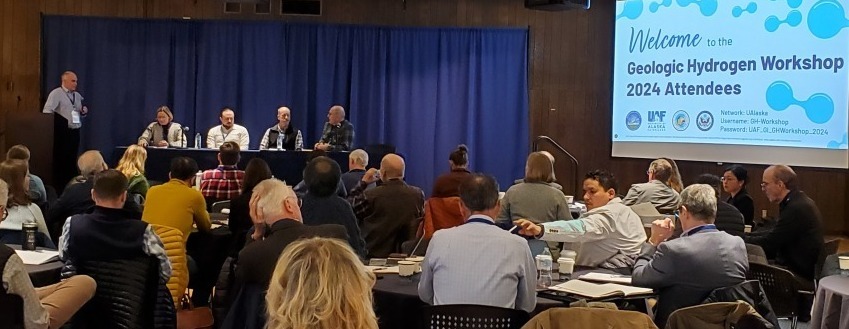|

Speakers and audience interact during the geologic
hydrogen workshop I helped organize and facilitate
Hi Barb,
Last month, I stepped up to the podium to lead activities at a 3-day scientific workshop in Fairbanks, Alaska. I felt grateful to be able to contribute by doing what I love: leading very engaging, efficient and effective activities.
Over 100 scientists, policy makers, industry leaders and others, from local to international, were in the room. The sponsors wanted their diverse input after every set of speakers. They allowed for 15-20 minutes to do that.
Smiling, I confidently introduced the Liberating Structure 1-2-4-all. It takes 15 minutes, and it has always worked for me.
Well, it didn't work.
I tried four times (adjusting something each time) and it still didn't work. Some people had trouble keeping silent during the first minute, and very few people shifted from pairs to quads to eights (the "all"). Some began leaving the room when activities began. The energy in the room began to drop.
That evening, I read the daily feedback forms. Many people said they loved the day and appreciated the interaction. That was good.
But some said things like "Give us time to talk!" "No more 1-2-4-all" "Stop interrupting us." "The activities are worthless." Ouch.
In a moment of self-compassion, I decided to focus on resting and being glad that people were obviously engaged, instead of trying to fix the process or defend myself.
By the next morning, my attitude had already shifted from judgement toward curiosity about how we could help people contribute more without feeling disrespected in any way.
We adjusted some activities and cut others to create time for open conversation. One sponsor, I'll call him "Tim," suggested that, for Day 3, we let the participants suggest questions and topics and self-organize their conversations.
(Note: this was something I had suggested during our planning meetings, but Tim had nixed it, saying "That's too loose; these people want structure!")
"Great idea, Tim!" I exclaimed. "Let's do it!"
The participants loved Day 3! They got to talk about what they wanted to talk about, and many continued talking for up to 2 hours after the workshop ended. The high level of engagment delighted the sponsors. (Whew!)
Have you ever led a meeting that didn't turn out like you planned? How did you take care of yourself during and after? I'd love to hear about it! Hit reply and tell me what happened.
Warmly,

Barb Bickford
This month's resources are about self-care. Consider joining us, in person or online.
Transitions and New Beginnings retreats
-- in person, one of two weekends, either in February or in April, 2025
Back by popular demand! If you are going through a transition in your life, you may feel disoriented and alone. Come join a retreat with people who are also navigating transitions. During a weekend away, we will explore what happened, how it's showing up in your life, and consider what might be coming next, using conversations, art and gentle movement. Wisdom and rest await you! Read more about these events.
Register for the February 5-7, 2025 retreat
Register for the April 4-6, 2025 retreat
A Conversation with Kathleen Paris
-- Online, Tuesday, January 7, 2025, 2 PM ET / 1 PM CT / 11 AM PT
Kathleen Paris, an accomplished facilitator and dear friend, has mastered self-care under one of life's hardest transitions: loss of a spouse.
Two years ago, Kathleen was writing a book about how she survived during her time of grief but had stalled and didn't know why. She came to one of our Transitions retreats, got unstuck and recently finished her lovely book: Gentle Comforts: For Women Grieving the Loss of a Beloved Life Companion. Learn more about Kathleen and her book.
We will meet on Tuesday, January 7th for a conversation with Kathleen and each other, about self-care during times of transition and grief. For now, save the date in your calendar, and watch for emails with more information.
PS: Kathleen's other books include Staying Healthy in Sick Organizations: The Clover Practice™ and Bringing Your Strategic Plan to Life.. All three books are well worth reading!
Related blog posts
-- Brush up on your meeting preparation
-- How can leaders get just a little more rest?
-- Embracing life transitions
Our current workshops and courses
Self care for meeting leaders
For the best results, meeting leaders should pay attention to four things:
- the task (agenda, desired outcomes)
- the process (what activities will support the tasks)
- the group (how the group interacts, what it values, whether they trust one another or not), and
- ourselves (how we think and feel and care for ourselves).
Frankly, it's a lot to juggle. We often pay so much attention to the first three that we ignore how we, ourselves, are thinking, feeling and showing up.
A case in point is my experience in Alaska: I was so busy setting up the room and coordinating the work of others, that I didn't spend as much time as I usually do preparing myself. I didn't have a plan B for the off-chance that 1-2-4-All wouldn't work.
This email's tip is simply to NOTICE what's going on with yourself as the leader of your meetings, as often as you can. You can ask yourself questions like these:
- What are you thinking? How is does what you think of yourself, the participants and/or the sponsors affect how you behave?
- How are you feeling? How is that impacting your leadership?
-
What can you do...
- Before the meeting to be at your best?
- During the meeting, especially if things don't go as planned?
-
After the meeting to recover after a disappointment or from the sheer effort of leading?
We will never do things perfectly and unexpected things will happen. The question is, how can we support ourselves so well, that we can also support a great outcome for the group?
Want even more tips? Access Ten Tips to Foster Online Engagement.
If you were forwarded this newsletter email, you may subscribe here.
You can also sign up for topics that you want to hear more about.
Photo Credit: Barb Bickford
|